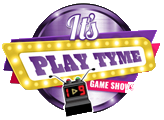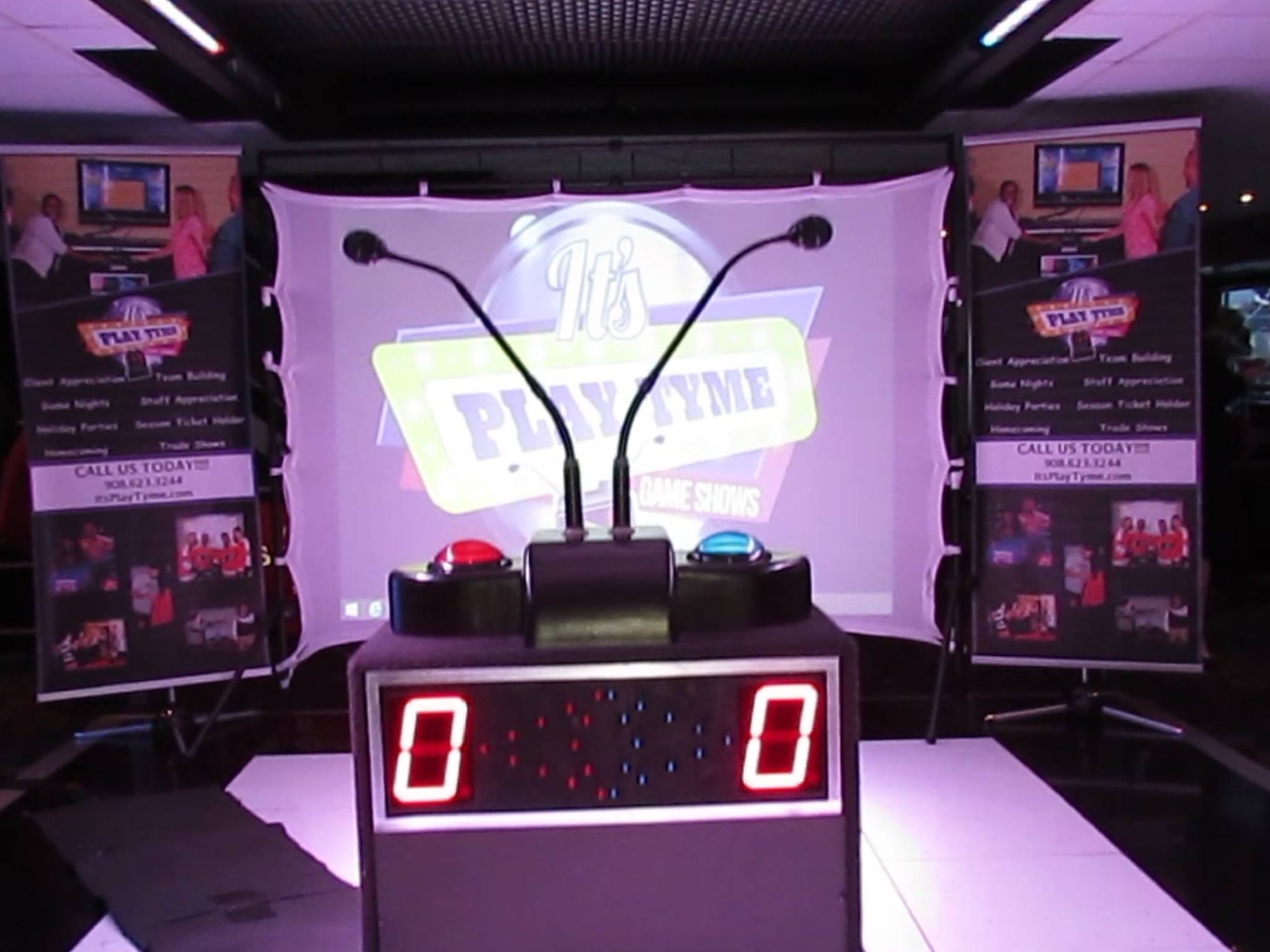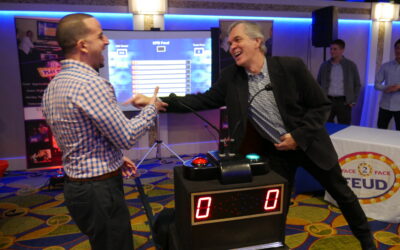Are you looking for a fun and interactive way to boost your team’s morale and promote leadership development?
Look no further than incorporating live game show dynamics into team building activities.
You can create a vibrant and engaging environment that encourages teamwork and enhances leadership skills simultaneously.
Imagine this: it’s Monday morning, and your team gathers in the office for a team-building session. Instead of the usual PowerPoint presentations and group discussions, you surprise them with a game show-themed activity.
There’s lights, sounds, buzzers, microphones, identical to what you see on television. The room fills with excitement and anticipation as your team members eagerly await the challenge that lies ahead.

attributes-of-a-great-team-player
>Book Now! For fun team building game ideas to boost morale.
As the game show begins, the competitive spirit ignites, and team members work together to answer trivia questions, solve puzzles, and complete physical challenges.
The once reserved and hesitant individuals now cheer each other on, communicate effectively, and showcase their leadership potential.
Throughout the game show, team members encounter various situations that require quick thinking, decision-making, and collaboration.
The dynamic nature of the game show format pushes individuals to step out of their comfort zones, take risks, and develop their leadership skills under pressure.
It’s a transformative experience where team dynamics are strengthened, and leadership potential is unlocked.
By the end of the game show, your team emerges not only as winners but as a cohesive unit bonded by shared experiences.
They walk away with a renewed sense of camaraderie, improved communication skills, and a deeper understanding of each other’s strengths and abilities.
So, why not harness the power of game shows to elevate your team’s performance and foster leadership development?
In this article, we will explore six game show strategies that can be leveraged to enhance team performance and strengthen team bonds.
Get ready to unleash the game show champion within!
Key Takeaways:
- Game shows can boost team morale and foster leadership development.
- Game show dynamics create a fun and interactive environment for team building activities.
- Game shows encourage teamwork, communication, and leadership skills.
- Game shows provide opportunities for individuals to step out of their comfort zones.
- Shared experiences in game shows strengthen team bonds and create a positive team culture.
1 – Strategies to Add Fun in the Workplace with a Game Show Theme
Creating a fun and enjoyable workplace is crucial for promoting employee satisfaction and productivity. When employees enjoy their work environment, it fosters a positive atmosphere and encourages greater engagement.
One popular way to add fun into the workplace is by incorporating game show dynamics into team building activities.
Game show activities add an element of excitement and entertainment to team building, making it more engaging and memorable for team members.
Just like in a game show, employees can participate in friendly competitions, solve challenging puzzles, and showcase their knowledge and skills.
This interactive and competitive format adds a sense of adventure and camaraderie to team building activities, creating a more dynamic and enjoyable experience for everyone involved.
By incorporating game show dynamics, teams can experience the thrill of competing, collaborating, and problem-solving together.
These activities not only boost morale and foster positive relationships but also enhance team dynamics and overall employee satisfaction.
Got Team Builder Games? – Press Play! #boostmorale #funatwork
![]()
Book a live game show experience today!
Contact us for further details.
For Immediate assistance by text – 917-670-4689
No deposit required.
We plan and facilitate all activities.
Embracing fun in the workplace through game show dynamics can have significant benefits for organizations. It promotes a culture of creativity, teamwork, and innovation.
When employees are having fun and enjoying their work environment, they are more motivated, engaged, and productive. This positive work culture also attracts top talent and improves employee retention rates.
Furthermore, game show dynamics in team building activities allow individuals to showcase their unique talents and strengths. This recognition and appreciation build self-confidence and encourage individuals to bring their best selves to the workplace.
Incorporating game show dynamics into team building activities is a win-win situation. Not only does it create a fun and enjoyable workplace, but it also strengthens team bonds, enhances collaboration, and improves overall team performance.
2 – What is the Psychology Behind Game Show Team Building?
Understanding the psychological aspects behind the success of game show team building activities is crucial for their effective implementation and the development of successful teams.
These activities promote team bonding, improve communication and collaboration, and enhance problem-solving skills.
1 – What are the Benefits of Engaged Team Building Activities?
Engaged team building activities foster a sense of team bonding and cohesion. Team members come together to solve challenges, share ideas, and work towards common goals.
This shared experience creates a sense of unity and camaraderie, fostering stronger relationships and collaboration within the team.
Furthermore, engaged team building activities improve communication and collaboration skills. Through interactive games and challenges, team members learn how to effectively communicate their ideas, listen to others, and work together towards a shared objective.
These skills are transferable to the workplace, leading to improved teamwork and overall team performance.
Problem-solving skills are also enhanced through engaged team building activities. As teams tackle challenges and obstacles presented in game show formats, they develop critical thinking skills, creativity, and the ability to think outside the box.
These problem-solving skills can be applied to real-world work scenarios, leading to more innovative solutions and improved team performance.

Fun-Team-Building-Events
>>>Book Now! For fun team building game ideas to boost morale.
2 – How does interactive learning through game shows contribute to team building?
Interactive learning is a powerful tool for effective team building. Game shows facilitate active learning and knowledge retention by engaging teams in hands-on and participatory activities.
Through active participation, team members gain a deeper understanding of concepts and principles while retaining information more effectively.
Interactive learning allows for immediate feedback, which is essential for the growth and development of individuals and teams. In game show formats, participants receive instant feedback on their performance, allowing them to assess their strengths and areas for improvement.
This feedback loop promotes a continuous learning process, leading to the development of new skills and the improvement of existing ones.
Moreover, interactive learning through game shows encourages teamwork and collaboration. By working together to solve challenges and achieve common goals, teams develop a collaborative mindset and the ability to leverage their collective knowledge and skills.
This collaborative learning approach fosters a culture of shared learning and growth, enhancing team performance and cohesion.
3 – How do shared experiences in game shows strengthen team bonds?
Shared experiences are crucial for building strong team bonds and fostering a sense of belonging within a team.
Game show team building activities offer unique opportunities for team members to collaborate, celebrate successes, and overcome challenges together.
Through these shared experiences, teams develop a stronger sense of cohesion, trust, and camaraderie.
When team members engage in collaborative activities and support each other in game show challenges, they build lasting connections and create a positive team culture.
Shared experiences also provide an opportunity for team members to celebrate their achievements together.
Whether it’s winning a game show challenge or overcoming a difficult task, these shared successes contribute to a sense of accomplishment and reinforce the team’s unity.
By fostering shared experiences, game shows strengthen team bonds and create a supportive and inclusive team environment, which ultimately leads to improved team performance and overall success.
| Benefits of Engaged Team Building Activities | Understanding the Impact of Interactive Learning | Strengthening Team Bonds Through Shared Experiences |
|---|---|---|
| Promotes team bonding | Facilitates active learning and knowledge retention | Builds stronger team cohesion and trust |
| Improves communication and collaboration | Provides immediate feedback for continuous improvement | Fosters a positive team culture |
| Enhances problem-solving skills | Encourages teamwork and collaboration | Celebrates shared successes |

boost-staff-morale
>>>Book Now! For fun team building game ideas to boost morale.
3 – How do you Leverage Team Building and Leadership Development with Game Shows?
Game shows offer a unique opportunity to leverage team building activities for leadership development within organizations.
By incorporating leadership challenges and skill development opportunities into game show formats, businesses can create impactful experiences that enhance both individual leadership capabilities and team dynamics.
Team building game shows not only foster collaboration and teamwork but also provide a platform for employees to enhance their leadership skills.
Through interactive and engaging game show strategies, organizations can create an environment that encourages leadership development while strengthening team bonds.
One effective way to leverage game shows for leadership development is by incorporating leadership challenges into the gameplay.
These challenges can simulate real-life scenarios, requiring participants to make decisions, solve problems, and demonstrate their leadership abilities.
By providing opportunities for skill development and decision-making under pressure, game shows create a dynamic learning experience that enhances leadership capabilities.
Furthermore, game shows can be designed to focus on specific leadership competencies, such as communication, problem-solving, strategic thinking, and adaptability.
By tailoring game show formats to target these competencies, organizations can provide a platform for individuals to improve their leadership skills and apply them in a collaborative team setting.
Additionally, game shows offer a fun and engaging way to strengthen team dynamics while developing leadership abilities.
The competitive nature of game shows fosters teamwork, communication, and collaboration among team members. Participants learn to work together, delegate tasks effectively, and leverage their individual strengths for the collective success of the team.

Game Show Team Building – winners
Another advantage of leveraging game shows for team building and leadership development is that they provide immediate feedback and opportunities for reflection.
After each challenge or round, teams can analyze their performance, identify areas for improvement, and develop strategies for future success.
This feedback loop promotes continuous learning and growth, allowing participants to refine their leadership skills and enhance their overall performance.
By leveraging team building game shows for leadership development, organizations can create a dynamic and engaging environment that fosters personal growth and strengthens team dynamics.
It is a powerful strategy that combines the excitement of game shows with the development of essential leadership skills.
4 – A Few Game Show Mechanics that Promote Leadership Skills
Involving game show mechanics in team building activities can be a powerful way to develop and strengthen leadership skills.
By presenting challenges that require decision-making, problem-solving, and strategic thinking, game shows offer individuals the opportunity to showcase their leadership abilities and cultivate new ones.
The competitive elements within game show dynamics create an environment that fosters leadership growth and boosts overall team performance.
1 – Incorporating Competitive Elements for Leadership Growth
Competitiveness is inherent in game shows, and it can be harnessed to promote leadership growth within teams.
By introducing challenges that encourage individuals to step up, make quick and authoritative decisions, and take charge, game shows provide a unique platform for developing leadership skills.
The pressure of competition pushes individuals to think critically, solve problems under time constraints, and exhibit effective decision-making.
Moreover, the competitive nature of game shows challenges team members to collaborate and communicate effectively under pressure. In high-stakes situations, leaders emerge and demonstrate their ability to motivate and guide their team towards success.
This fosters a sense of leadership growth and an understanding of the importance of collaboration and effective teamwork in achieving common goals.
2 – Strategies for Effective Team Collaboration in Game Formats
Effective team collaboration is crucial for game shows to be successful. To promote collaboration, teams can implement various strategies that encourage open communication, active listening, and equal participation.
These strategies allow team members to effectively share ideas, work together to solve challenges, and harness each other’s strengths.
- Establish clear communication channels: Ensure that all team members have a platform to express their ideas and opinions.
This can include scheduled team meetings, dedicated communication tools, or even an open-door policy where everyone feels comfortable sharing their thoughts. - Encourage active listening: Actively listen to team members’ ideas and viewpoints, fostering an inclusive and collaborative environment.
This can be achieved by maintaining eye contact during discussions, summarizing key points, and asking clarifying questions to ensure understanding. - Promote equal participation: Create an atmosphere where every team member feels empowered to contribute their unique perspectives and expertise.
Distribute responsibilities evenly and ensure that everyone has an opportunity to actively participate in solving challenges.
3 – Highlighting Individual Strengths in Team Challenges
Game show dynamics provide an excellent opportunity to highlight and leverage individual strengths within team challenges.
By designing challenges that require diverse skill sets and expertise, game shows allow team members to showcase their individual strengths and contribute to the overall success of the team.
Recognizing and utilizing individual strengths within team challenges not only boosts team performance but also fosters a sense of empowerment and confidence among team members.
This highlights the importance of acknowledging the unique abilities of each team member and valuing their contributions.
For example, a team member with excellent problem-solving skills can take the lead in analyzing complex challenges, while someone with strong communication skills can effectively convey information to the team.
By acknowledging and leveraging these individual strengths, teams can achieve greater synergy and drive success in their game show endeavors.

5 – Key Elements of a Successful Team Building Game Show
1 – Choosing the Right Games for Your Team’s Objectives
When organizing a team building game show, it is essential to consider the specific objectives of your team. Different games serve different purposes, whether it’s promoting communication, problem-solving, trust-building, or leadership development.
By selecting the right games that align with your team’s objectives, you can ensure that the activities will effectively contribute to the desired outcomes and team dynamics.
For example, if your team needs to enhance their communication skills, you may opt for games that require effective verbal or non-verbal communication.
On the other hand, if your objective is to foster leadership development, you may choose challenges that require decision-making and strategic thinking.
By tailoring the game selection to your team’s objectives, you can create a game show that addresses their specific needs and areas of improvement.
2 – Customizing Game Content for Maximum Engagement
Customizing game content is a key factor in maximizing engagement and relevance for your team members.
By tailoring the game show formats, questions, and challenges to the specific needs and preferences of your team, you can ensure that they are fully engaged and invested in the activities.
Consider the demographics, interests, and skill levels of your team members when customizing the game content.
Personalize the questions and challenges to reflect their unique experiences and knowledge. This customization will create a sense of ownership and relevance, leading to higher levels of engagement and participation throughout the game show.
Additionally, incorporating personalized game content can also help create a more inclusive environment, showcasing diverse perspectives and talents within the team.
By appealing to their individual strengths and interests, you create a game show that resonates with each team member, leading to a more successful and enjoyable team building experience.
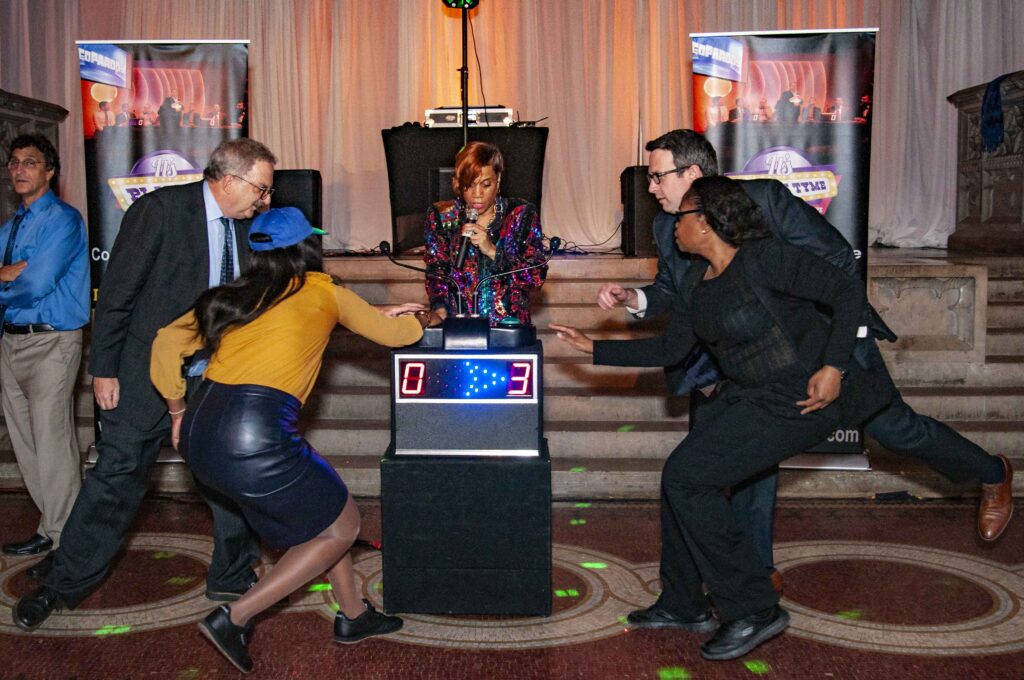
Trivia Night NJ
>>Book Now! For fun team building game ideas to boost morale.
3 – Role of a Skilled Host in Facilitating Game Flow
A skilled host plays a crucial role in facilitating the flow of a team building game show. They are responsible for guiding the participants, engaging the audience, providing clear instructions, and maintaining the energy and momentum of the game.
Choose a host who possesses strong communication skills, charisma, and the ability to connect with the team members.
A skilled host knows how to create a supportive and inclusive atmosphere, ensuring that everyone feels involved and valued in the game show experience.
They should be able to adapt to unexpected situations, keep the game moving smoothly, and add an element of excitement to the proceedings.
A competent game show host can effectively manage the timing, transitions, and interactions within the team, facilitating a seamless and enjoyable game flow.
Their presence sets the tone for the entire event, ensuring that the team members remain engaged and enthusiastic throughout the game show.
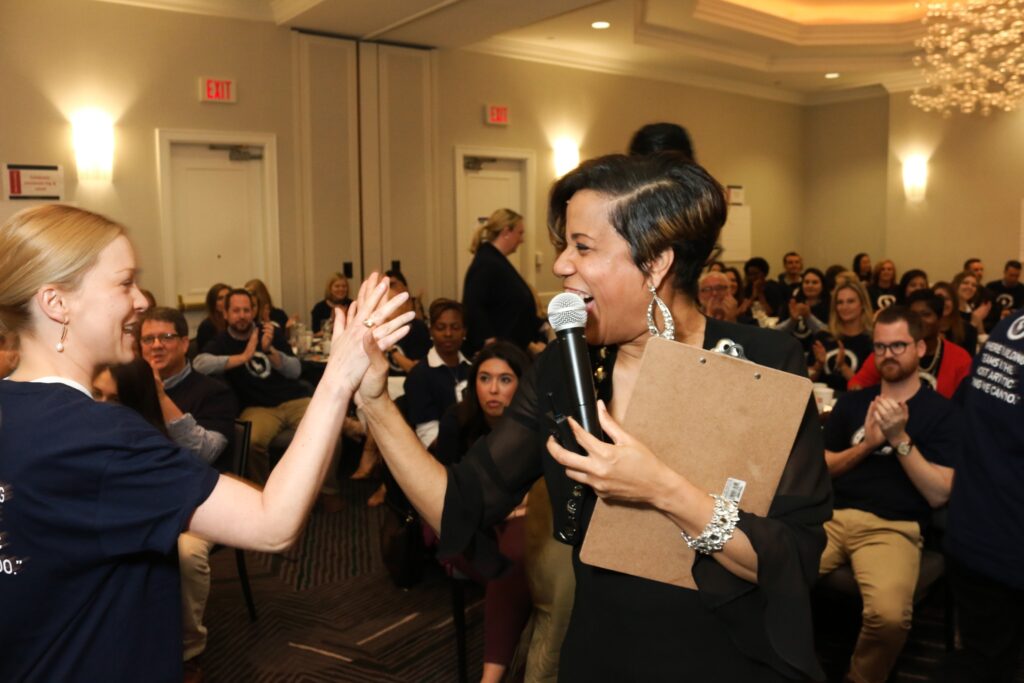
stay motivated at work
6 – The Use of Technology in Interactive Team Building
Technology plays a significant role in facilitating interactive team building experiences, particularly in virtual settings.
Digital platforms and user-friendly apps offer a range of features and functionalities that enhance remote team engagement and participation.
These technological tools have revolutionized the way teams engage in team building activities, providing a seamless and immersive experience that fosters collaboration, communication, and camaraderie.
a- Leveraging Digital Platforms for Virtual Game Shows
Virtual team building has become increasingly popular, and digital game platforms play a crucial role in creating immersive virtual game shows.
These platforms offer a variety of game show formats that can be customized to suit the specific objectives and dynamics of remote teams.
Features such as live video streaming, real-time feedback, and interactive elements enable teams to engage in team building activities effectively, regardless of their physical location.
Virtual game shows provide a unique opportunity for remote team members to connect, communicate, and collaborate in a fun and engaging manner.
b – Utilizing User-Friendly Apps to Enhance Participation
Team building apps have revolutionized the way participants engage in game show activities. These user-friendly apps provide seamless access to game show content, allowing team members to actively participate and contribute to the overall experience.
With features such as instant scoring, real-time feedback, and interactive challenges, team building apps enhance participation and engagement, making the experience more dynamic and enjoyable.
By utilizing these apps, teams can break down barriers and ensure that every member feels included and valued in the team building process.
c – Tracking Progress and Celebrating Wins Digitally
Digital platforms and team building apps also offer the capability to track progress and celebrate team achievements in real-time.
Leaderboards, badges, and virtual celebrations can be utilized to recognize and reward team members’ efforts and accomplishments.
Tracking progress not only adds an element of healthy competition but also motivates team members to actively participate and strive for success.
By celebrating wins digitally, teams can foster a sense of accomplishment, pride, and camaraderie, despite being physically apart.
In conclusion, technology plays a vital role in interactive team building, particularly in virtual settings.
Digital platforms and user-friendly apps enhance remote team engagement and participation, providing opportunities for effective collaboration, communication, and celebration.
By leveraging these tools, teams can overcome geographical barriers and build strong connections that contribute to overall team success.
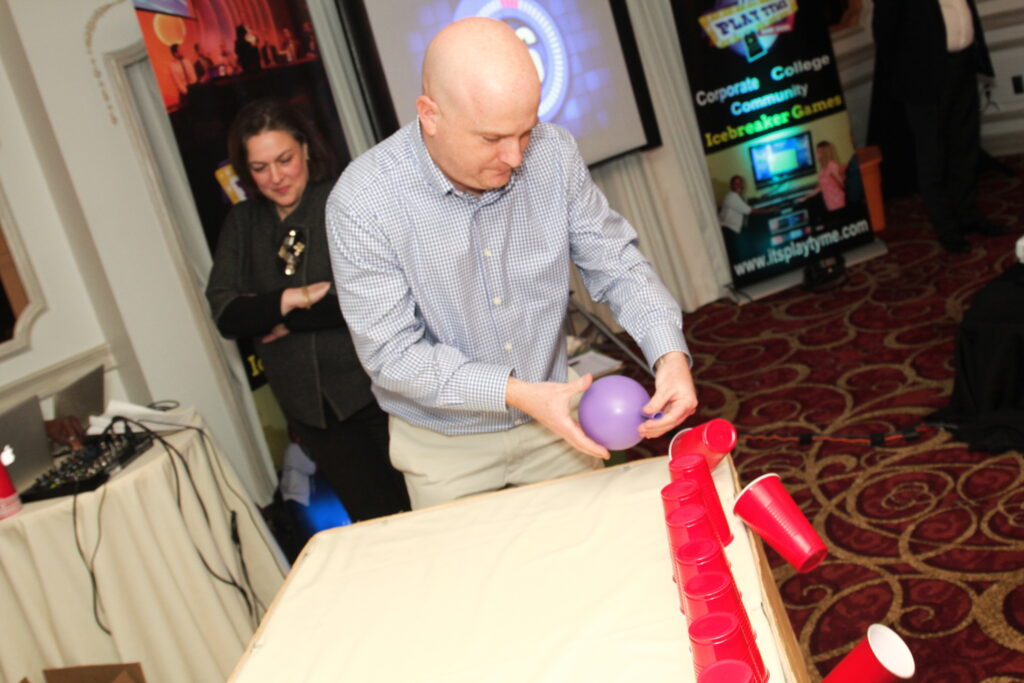
this-blows-minute-to-win-it
7 – Highlight Creativity and Quick Thinking through Team Games
Team games in a game show format provide an interactive and engaging platform for cultivating creativity and quick thinking skills among team members.
By incorporating challenges that require innovative problem-solving, brainstorming, and thinking on their feet, teams can develop and enhance their creative and quick thinking abilities.
These skills are crucial in the workplace, where the ability to generate fresh ideas and make prompt decisions is highly valued.
Through team games, individuals are encouraged to push their boundaries and explore different perspectives, fostering creativity and generating unique solutions.
The fast-paced nature of game show dynamics compels participants to think quickly and adapt to changing circumstances, honing their quick thinking skills.
The competitive element further stimulates cognitive agility and encourages participants to come up with smart and efficient strategies.
Team games also offer the opportunity for collaboration and teamwork, allowing team members to bounce ideas off one another and combine their strengths to solve challenges.
By working together in a game show setting, teams develop a sense of camaraderie and trust, creating a supportive environment that encourages risk-taking and fosters the growth of creativity and quick thinking skills.
By engaging in team games that prioritize creativity and quick thinking, participants not only enhance their individual skills but also contribute to overall team performance.
The ability to approach problems with a fresh perspective and make rapid decisions enables teams to overcome obstacles efficiently and seize opportunities effectively.
The emphasis on creativity and quick thinking in team games cultivates a culture of innovation and adaptability, essential qualities for success in a dynamic and competitive business environment.
Through team games, organizations can unlock the full potential of their teams by fostering creativity and quick thinking.
By incorporating these game show dynamics into team building activities, leaders can create an engaging and stimulating environment that promotes not only the development of these skills but also strengthens team bonds and enhances overall team performance.
8 – Three Popular Team Building Game Ideas to Consider
When it comes to team building activities, incorporating game show formats can be both entertaining and effective.
Game shows offer a unique opportunity for team members to showcase their knowledge, enhance communication and collaboration, and foster healthy competition.
Below, we will explore three game show ideas that can be utilized for team building exercises:

1 – Jeopardy: A Trivia Challenge to Showcase Knowledge
One classic game show format that can be adapted for team building activities is Jeopardy. This trivia-based game challenges participants to answer questions from various categories, testing their knowledge and problem-solving skills.
Jeopardy is an ideal game for team building as it encourages healthy competition, fosters knowledge sharing within the team, and promotes collaboration.
By incorporating Jeopardy into team building activities, teams can showcase their collective knowledge and strengthen team collaboration in an engaging and fun way.
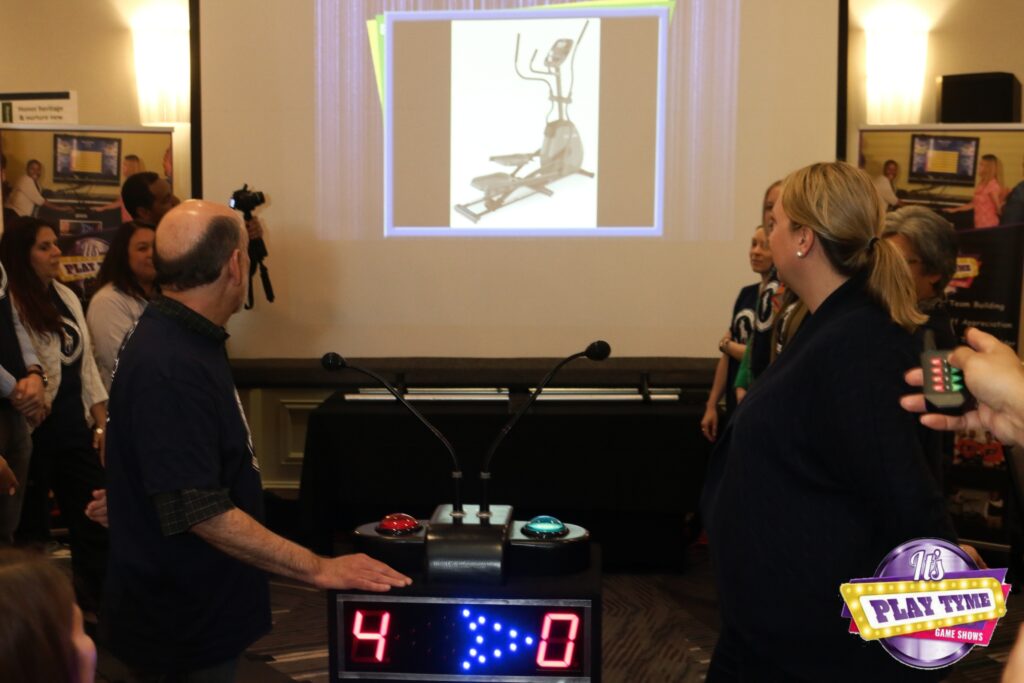
2 – Pictionary to Charades: Drawing and Acting as Communication Tools
Drawing and acting games such as Pictionary and Charades are excellent communication tools that can be leveraged for team building.
These games require team members to effectively communicate through non-verbal means, rely on creativity, and collaborate to achieve a common goal.
Adding Pictionary and Charades into team building activities encourages teamwork, improves non-verbal communication skills, and promotes creativity among team members.
By engaging in these drawing and acting games, teams can strengthen their bonds and enhance communication within the group.
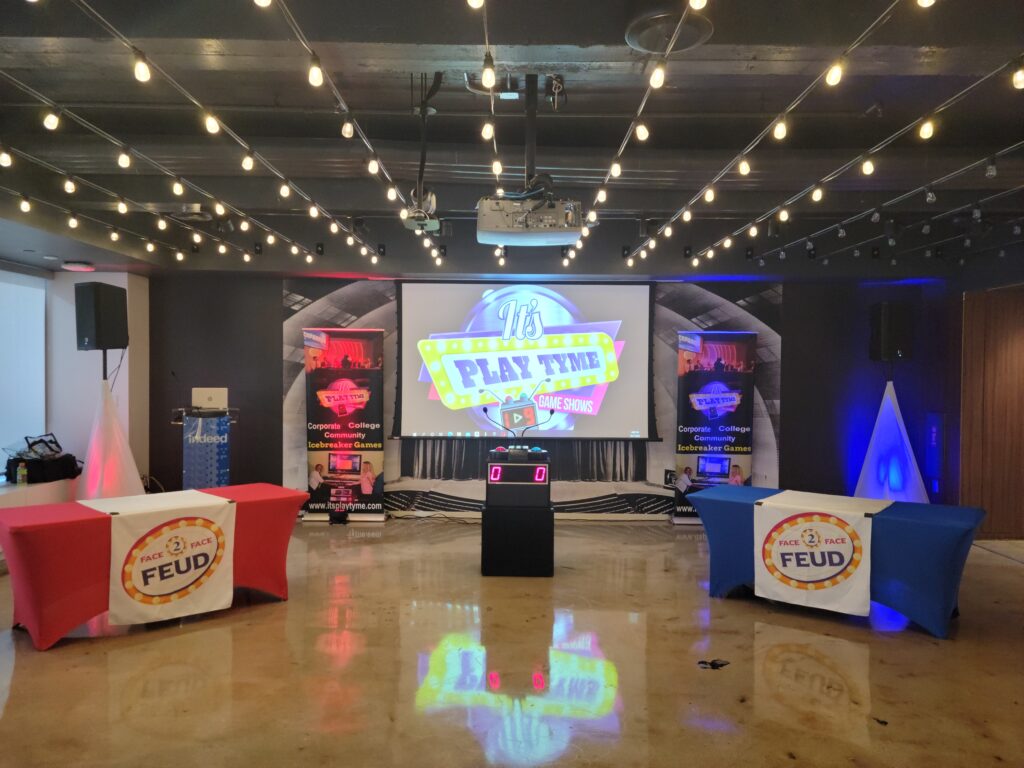
Game Show Set
3 – Family Feud: Understanding the Power of Survey Knowledge
Family Feud is another popular game show format that can be adapted for team building activities.
This game relies on survey knowledge, where teams have to guess the most popular answers to survey questions.
Family Feud encourages team collaboration, active listening, and critical thinking skills.
By adopting the Family Feud game format, teams can enhance their understanding of each other’s perspectives, promote effective communication, and develop problem-solving abilities.
Utilizing survey knowledge in team building activities fosters a sense of unity and solidarity among team members.
| Game Show | Objective | Benefits |
|---|---|---|
| Jeopardy | Showcasing knowledge | Promotes healthy competition Enhances team collaboration |
| Pictionary and Charades | Improving communication skills | Encourages teamwork and collaboration Promotes creativity |
| Family Feud | Understanding different perspectives | Enhances communication Develops problem-solving abilities |

diversity-and-inclusion-activities
9 – Team Building Across Diverse Workforces
Creating inclusive team building activities is crucial for fostering engagement and participation across diverse workforces.
By adapting activities to accommodate different personality types, teams can create an inclusive environment that promotes teamwork and collaboration.
In this section, we will explore strategies for adapting team building activities to ensure inclusivity, considerations for incorporating both physical and non-physical game challenges, and the importance of accessibility in game design and execution.
a – Adapting Activities for All Personality Types
When planning team building activities, it is important to consider the diverse personality types within your workforce.
Some team members may be more introverted and prefer activities that allow for individual reflection and analysis, while others may be more extroverted and thrive in social and interactive settings.
By offering a variety of activities that cater to different preferences and communication styles, you can ensure that all team members are engaged and included.
b – Considerations for Physical and Non-Physical Game Challenges
Inclusive team building activities should incorporate both physical and non-physical game challenges to cater to the diverse abilities and preferences of team members.
While physical challenges can promote teamwork and collaboration, it is essential to provide alternative options for individuals who may have physical limitations.
Non-physical challenges, such as problem-solving or trivia games, can engage team members who may not be able to participate in physical activities. By offering a range of options, you can ensure that everyone can contribute and feel included.
c – Ensuring Accessibility in Game Design and Execution
Accessibility is a critical aspect of inclusive game design and execution. Consider factors such as physical accessibility, sensory impairments, and technology limitations when designing team building activities.
Ensure that venues and equipment are accessible to all team members. Provide accommodations for individuals with sensory impairments, such as providing alternative formats or captions for audio and visual content.
Also, consider the technological capabilities and limitations of your team members, ensuring that everyone can fully participate in the game without exclusion.
| Benefits of Inclusive Team Building | Strategies for Adaptation |
|---|---|
| Promotes teamwork and collaboration | Offer a variety of activities that cater to different personality types |
| Fosters engagement and participation | Incorporate both physical and non-physical challenges to accommodate diverse abilities |
| Creates an inclusive and welcoming environment | Ensure accessibility through venue, equipment, and technological considerations |
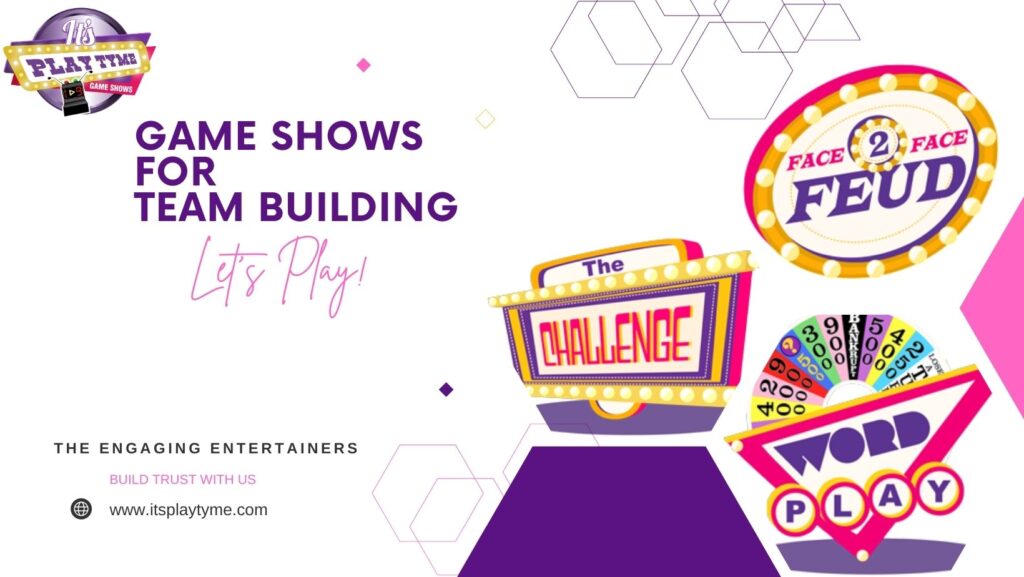
game-shows-for-team-building-NYC-METRO
10 – Measuring the ROI of Game Show Team Building Exercises
Assessing the effectiveness and impact of game show team building interventions is crucial in determining their return on investment (ROI) and their contribution to team performance.
To measure the ROI of these interventions, organizations can employ various strategies that provide valuable insights into their value and success.
One effective approach is evaluating key performance indicators (KPIs) that align with the objectives of the team building activities.
By tracking metrics such as improved communication, increased collaboration, and enhanced problem-solving skills, organizations can quantify the tangible benefits that result from their game show interventions.
Another valuable resource for measuring the ROI is the feedback from participants.
Collecting input on their experiences, perceived impact, and suggestions for improvement allows organizations to gauge the effectiveness of the team building interventions.
This qualitative feedback complements the quantitative data obtained from KPIs, offering a holistic view of the ROI.
Observable outcomes are also vital in measuring the effectiveness of game show team building interventions.
By monitoring team dynamics, employee engagement, and overall performance, organizations can witness firsthand the positive changes brought about by these interventions.
These observable outcomes validate the ROI and provide concrete evidence of the value of game show team building.
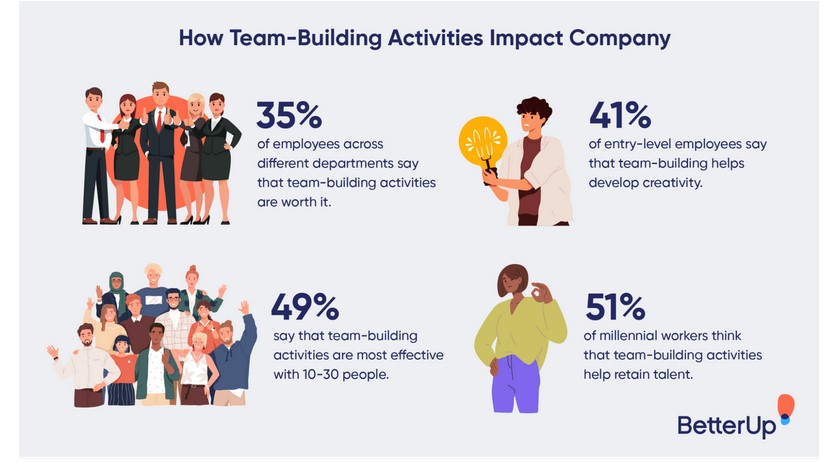
team-building-impact-statistics
FAQ
Can game show dynamics enhance team performance and employee satisfaction?
Yes, incorporating game show dynamics into team building activities can boost team morale, foster engagement, and create a fun and enjoyable workplace environment.
What are the benefits of engaged team building activities?
Engaged team building activities promote team bonding, improve communication and collaboration, and enhance problem-solving skills.
How do shared experiences in game shows strengthen team bonds?
Shared experiences in game shows foster trust, camaraderie, and a sense of cohesion within teams.
How can game shows be leveraged for team building and leadership development?
By incorporating leadership challenges and skill development opportunities, game shows provide a platform for enhancing leadership capabilities and strengthening team dynamics.
How do competitive game show mechanics promote leadership growth?
Competitive elements in game shows require decision-making, problem-solving, and strategic thinking, providing opportunities for individuals to showcase and develop their leadership skills.
What strategies promote effective team collaboration in game formats?
Strategies for effective team collaboration in game formats include open communication, active listening, and equal participation.
How do you choose the right games for team building game shows?
The selection of games should align with the specific objectives and dynamics of the team, such as promoting communication, problem-solving, trust-building, or leadership development.
How can game content be customized to ensure maximum engagement?
Game content can be tailored to the specific needs and preferences of the team, enhancing overall engagement and participation.
What is the role of a skilled host in facilitating a team building game show?
A skilled host guides participants, provides instructions, and maintains the energy and momentum of the game, contributing to the overall success and engagement of the team building game show.
How can technology enhance virtual team building experiences?
Digital platforms offer interactive features and various game show formats that enable remote teams to effectively engage in team building activities.
What are some effective team building game ideas?
Popular game show formats like Jeopardy, Pictionary, Charades, and Family Feud can all be adapted to promote knowledge showcasing, communication skills, and collaborative problem-solving.
How can team building activities be adapted for all personality types in diverse workforces?
Adapting activities to accommodate individual preferences, communication styles, and needs helps create an inclusive environment that fosters engagement and participation from all personality types.
What considerations should be made for physical and non-physical game challenges in team building activities?
By offering a variety of options that accommodate different abilities and preferences, teams can create an inclusive environment that promotes teamwork and collaboration.
Why is accessibility important in game design and execution for team building activities?
Considering factors such as physical accessibility, sensory impairments, and technology limitations helps create a more inclusive and engaging experience for all participants.
